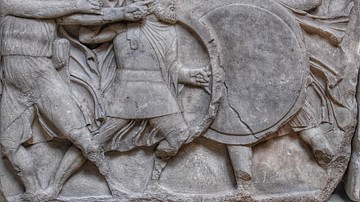Search
Did you mean: Delos?
Search Results

Definition
Sparta
Sparta was one of the most important city-states in ancient Greece and was famous for its military prowess. The professional and well-trained Spartan hoplites with their distinctive red cloaks and long hair were probably the best and most...

Definition
Neodamodeis
A huge part of the Spartan population was made up of those who were not actually Spartan, the helots; a cause of great concern to the Spartans throughout their history. These helots were slaves that were usually captives of the Spartans forced...

Article
The Grand Strategy of Classical Sparta
In ancient Lacedaemon, as in all enduring political communities, there was a symbiotic relationship between the form of government chosen, the way of life that this form of government fostered, and the grand strategy that the community gradually...

Article
The Delian League, Part 2: From Eurymedon to the Thirty Years Peace (465/4-445/4 BCE)
This text is part of an article series on the Delian League. The second phase of the Delian League's operations begins with the Hellenic victory over Mede forces at Eurymedon and ends with the Thirty Years Peace between Athens and Sparta...

Article
Ancient Greek Society
Although ancient Greek Society was dominated by the male citizen, with his full legal status, right to vote, hold public office, and own property, the social groups which made up the population of a typical Greek city-state or polis were...

Article
Spartan Women
Spartan women had more rights and enjoyed greater autonomy than women in any other Greek city-state of the Classical Period (5th-4th centuries BCE). Women could inherit property, own land, make business transactions, and were better educated...

Definition
Peloponnesian League
The Peloponnesian League (c. 550 BCE - c. 366 BCE) was a loose confederation of Greek city-states led by Sparta. The League was the oldest and longest-lasting political association in the ancient Greek world. For Sparta, the League gave it...

Article
Agoge, the Spartan Education Program
The agoge was the ancient Spartan education program, which trained male youths in the art of war. The word means "raising" in the sense of raising livestock from youth toward a specific purpose. The program was first instituted by the lawgiver...

Definition
Battle of Thermopylae
Thermopylae is a mountain pass near the sea in northern Greece which was the site of several battles in antiquity, the most famous being that between Persians and Greeks in August 480 BCE. Despite being greatly inferior in numbers, the Greeks...

Definition
Pericles
Pericles (l. 495–429 BCE) was a prominent Greek statesman, orator, and general during the Golden Age of Athens. The period in which he led Athens, in fact, has been called the Age of Pericles due to his influence, not only on his city's fortunes...